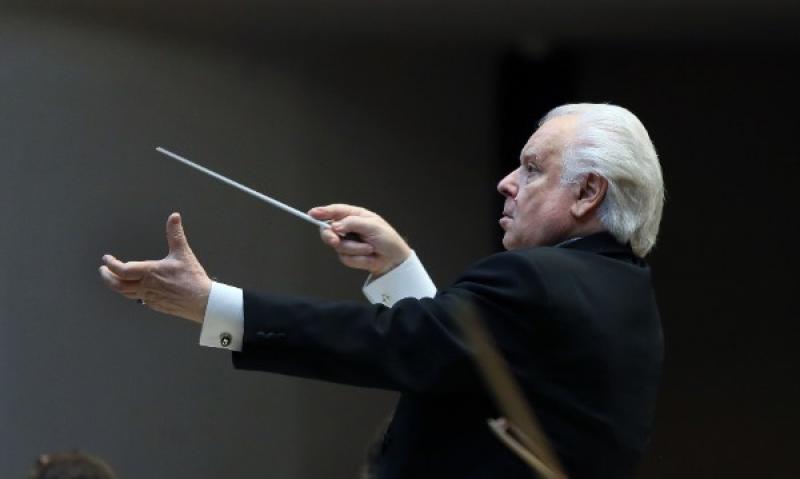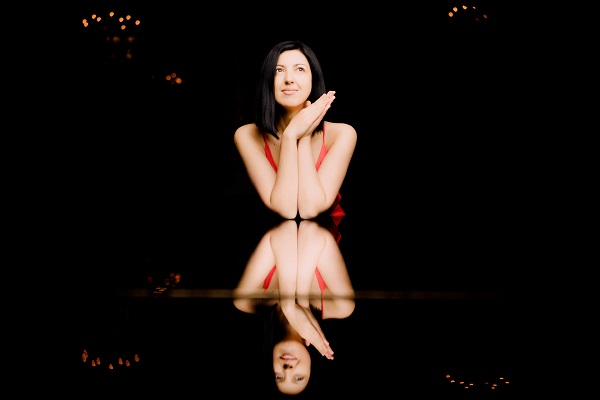Dariescu, Moscow Philharmonic Orchestra, Simonov, Symphony Hall, Birmingham review - Soviet fear and loathing | reviews, news & interviews
Dariescu, Moscow Philharmonic Orchestra, Simonov, Symphony Hall, Birmingham review - Soviet fear and loathing
Dariescu, Moscow Philharmonic Orchestra, Simonov, Symphony Hall, Birmingham review - Soviet fear and loathing
Brutal yet beautiful performance of Shostakovich's Tenth Symphony

It remains some of the most terrifying music ever written. Shostakovich’s Tenth Symphony - the composer’s portrayal of the fear and anxiety felt under Stalin's regime - is a horrifyingly brutal musical portrayal of life lived under a totalitarian reign.
The intense claustrophobia of the work was at once expertly captured in the orchestra’s strong yet subdued sound. Simonov slyly upped the ante with a gradual increase in both volume and tempo to bring out almost unbearably garish orchestral tones, with thunderous percussion. The second movement ended with a brash, gaudy splash of carnivalesque colour, while the dark, heavy strings of the third offered the merest chinks of light as tiny glimmers of hope. Simonov’s hands seemed to vibrate with the music as he conducted the final Andante-Allegro movement, sewing the symphony up with a stylish finish.  An easy listen this was not. Which, for music as dark as this, is a good thing. The pain, dirt, grime, slog, unease and uncertainty which the music references was fully explored and exhibited by this marvelous orchestra, and what was most notable was the passion and potency heard in the symphony’s quietest passages.Preceding this was some more Russian Music - Tchaikovsky’s First PIano Concerto, and the UK premiere of Event Horizon, written by the Russian/Hungarian composer Maria Antal. Simonov commissioned Event Horizon when the composer happened to be reading Stephen Hawking’s A Brief History of Time, and, as its title suggests, concepts of space and time are very much at the heart of this work’s inspiration. Written in quite a minimalist style, its energetic opening featured scurrying strings peppered with bursts of brass, and celestial influences were heard throughout the work. Its ending was a bit on the polite side though, and could have had a slightly bigger bang.
An easy listen this was not. Which, for music as dark as this, is a good thing. The pain, dirt, grime, slog, unease and uncertainty which the music references was fully explored and exhibited by this marvelous orchestra, and what was most notable was the passion and potency heard in the symphony’s quietest passages.Preceding this was some more Russian Music - Tchaikovsky’s First PIano Concerto, and the UK premiere of Event Horizon, written by the Russian/Hungarian composer Maria Antal. Simonov commissioned Event Horizon when the composer happened to be reading Stephen Hawking’s A Brief History of Time, and, as its title suggests, concepts of space and time are very much at the heart of this work’s inspiration. Written in quite a minimalist style, its energetic opening featured scurrying strings peppered with bursts of brass, and celestial influences were heard throughout the work. Its ending was a bit on the polite side though, and could have had a slightly bigger bang.
Romanian born British pianist Alexandra Dariescu (pictured above by Marco Borggreve) was the soloist for the concerto. She gave a wonderfully starry rendition, opening with bold, strident chords. The pizzicato strings at the start of the second movement provided a gentle and tender backdrop to a lyrical flute solo, which Dariescu then echoed with a golden. honeyed timbre. Her playing in the third and final movement was spicy and spirited, with Simonov expertly guiding the orchestra through shifting tempi, before the work erupted in a dazzling finale.
rating
Explore topics
Share this article
The future of Arts Journalism
You can stop theartsdesk.com closing!
We urgently need financing to survive. Our fundraising drive has thus far raised £49,000 but we need to reach £100,000 or we will be forced to close. Please contribute here: https://gofund.me/c3f6033d
And if you can forward this information to anyone who might assist, we’d be grateful.

Subscribe to theartsdesk.com
Thank you for continuing to read our work on theartsdesk.com. For unlimited access to every article in its entirety, including our archive of more than 15,000 pieces, we're asking for £5 per month or £40 per year. We feel it's a very good deal, and hope you do too.
To take a subscription now simply click here.
And if you're looking for that extra gift for a friend or family member, why not treat them to a theartsdesk.com gift subscription?
more Classical music
 Jakub Hrůša and Friends in Concert, Royal Opera review - fleshcreep in two uneven halves
Bartók kept short, and a sprawling Dvořák choral ballad done as well as it could be
Jakub Hrůša and Friends in Concert, Royal Opera review - fleshcreep in two uneven halves
Bartók kept short, and a sprawling Dvořák choral ballad done as well as it could be
 Monteverdi Choir, ORR, Heras-Casado, St Martin-in-the-Fields review - flames of joy and sorrow
First-rate soloists, choir and orchestra unite in a blazing Mozart Requiem
Monteverdi Choir, ORR, Heras-Casado, St Martin-in-the-Fields review - flames of joy and sorrow
First-rate soloists, choir and orchestra unite in a blazing Mozart Requiem
 Cho, LSO, Pappano, Barbican review - finely-focused stormy weather
Chameleonic Seong-Jin Cho is a match for the fine-tuning of the LSO’s Chief Conductor
Cho, LSO, Pappano, Barbican review - finely-focused stormy weather
Chameleonic Seong-Jin Cho is a match for the fine-tuning of the LSO’s Chief Conductor
 Classical CDs: Shrouds, silhouettes and superstition
Cello concertos, choral collections and a stunning tribute to a contemporary giant
Classical CDs: Shrouds, silhouettes and superstition
Cello concertos, choral collections and a stunning tribute to a contemporary giant
 Appl, Levickis, Wigmore Hall review - fun to the fore in cabaret and show songs
A relaxed evening of light-hearted fare, with the accordion offering unusual colours
Appl, Levickis, Wigmore Hall review - fun to the fore in cabaret and show songs
A relaxed evening of light-hearted fare, with the accordion offering unusual colours
 Lammermuir Festival 2025, Part 2 review - from the soaringly sublime to the zoologically ridiculous
Bigger than ever, and the quality remains astonishingly high
Lammermuir Festival 2025, Part 2 review - from the soaringly sublime to the zoologically ridiculous
Bigger than ever, and the quality remains astonishingly high
 BBC Proms: Ehnes, Sinfonia of London, Wilson review - aspects of love
Sensuous Ravel, and bittersweet Bernstein, on an amorous evening
BBC Proms: Ehnes, Sinfonia of London, Wilson review - aspects of love
Sensuous Ravel, and bittersweet Bernstein, on an amorous evening
 Presteigne Festival 2025 review - new music is centre stage in the Welsh Marches
Music by 30 living composers, with Eleanor Alberga topping the bill
Presteigne Festival 2025 review - new music is centre stage in the Welsh Marches
Music by 30 living composers, with Eleanor Alberga topping the bill
 Lammermuir Festival 2025 review - music with soul from the heart of East Lothian
Baroque splendour, and chamber-ensemble drama, amid history-haunted lands
Lammermuir Festival 2025 review - music with soul from the heart of East Lothian
Baroque splendour, and chamber-ensemble drama, amid history-haunted lands
 BBC Proms: Steinbacher, RPO, Petrenko / Sternath, BBCSO, Oramo review - double-bill mixed bag
Young pianist shines in Grieg but Bliss’s portentous cantata disappoints
BBC Proms: Steinbacher, RPO, Petrenko / Sternath, BBCSO, Oramo review - double-bill mixed bag
Young pianist shines in Grieg but Bliss’s portentous cantata disappoints
 theartsdesk at the Lahti Sibelius Festival - early epics by the Finnish master in context
Finnish heroes meet their Austro-German counterparts in breathtaking interpretations
theartsdesk at the Lahti Sibelius Festival - early epics by the Finnish master in context
Finnish heroes meet their Austro-German counterparts in breathtaking interpretations
 Classical CDs: Sleigh rides, pancakes and cigars
Two big boxes, plus new music for brass and a pair of clarinet concertos
Classical CDs: Sleigh rides, pancakes and cigars
Two big boxes, plus new music for brass and a pair of clarinet concertos

Add comment